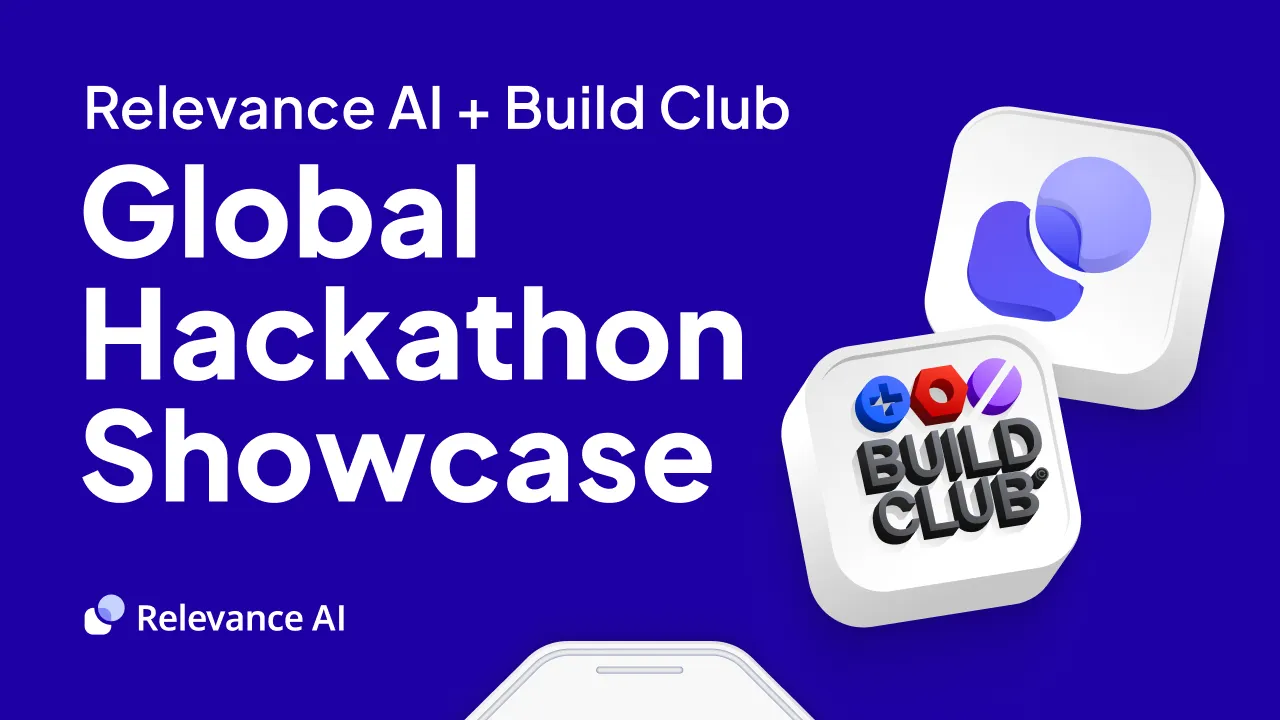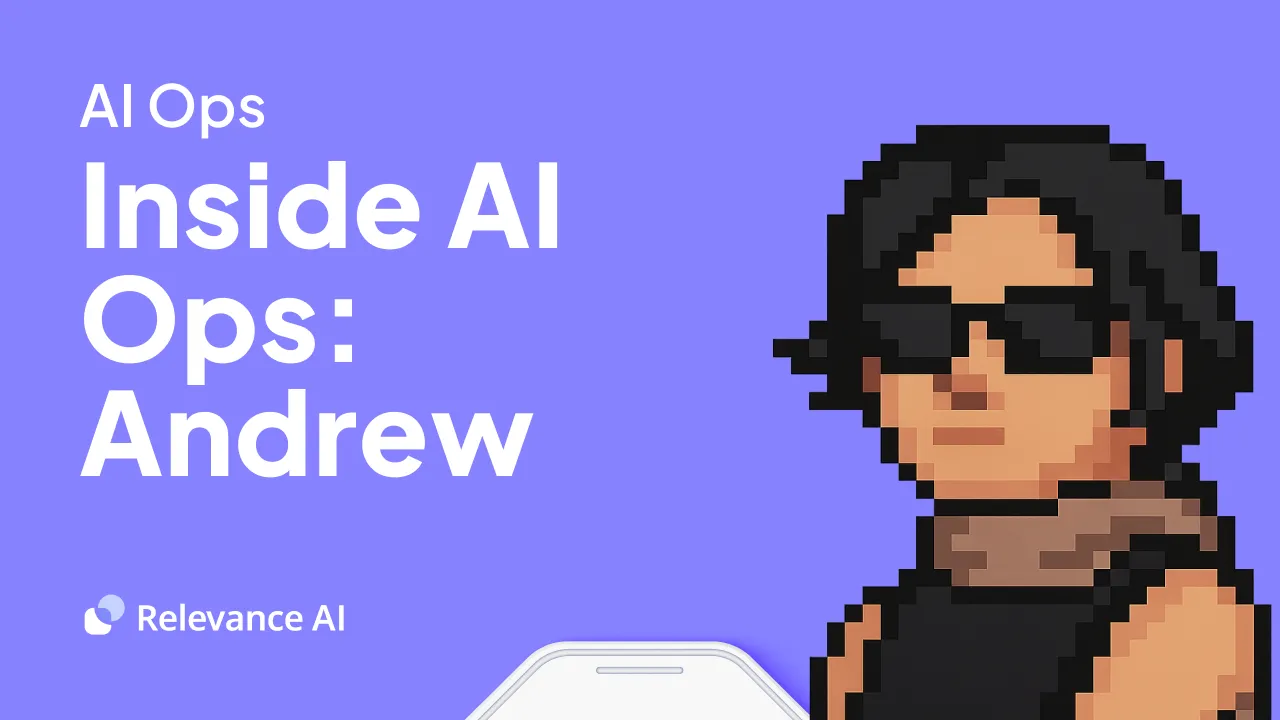
Introduction
Recently, Relevance AI partnered with Build Club to support hackathon participants across the globe to solve real-world problems with the help of AI.
In just 24 hours, the following hackathon teams were able to leverage Relevance's agent building platform to build impactful solutions such as:
- Reducing food waste.
- Improving the language learning experience.
- Supporting post-surgery rehabilitation.
- Empowering charity fundraising efforts.
- Improving candidate job search experience.
- Providing curated newsletters to help reduce information overwhelm.
Each of these solutions demonstrate the versatility and real-world impact AI agents have across a wide-range of problems across many different domains.
Take a look at the amazing solutions these AI builder teams were able to create in a single day!
Hackathon Showcase
Post surgery support - RehabWise/Healbot
After any surgical procedure, patients enter a rehabilitation phase where they need to regain strength, mobility and overall health. Successful rehab requires a combination of proper guidance, support and adherence to a recovery plan.
However, post-surgery instructions and guidance usually come from many different sources like doctors, physical therapists and more. This fragmentation of information can make it difficult to know what steps to follow, in what order, and to stay motivated.
Rehabwise (or, Healbot), uses Relevance to solve this problem by incorporating bio health stats from a fitness tracker, with a day-by-day rehabilitation plan as well as motivational quotes.
Relevance Hackathon Solution Overview:
Rehabwise is a streamlit app that allows users to enter their surgery details, such as the type of surgery (e.g. knee surgery), the specific surgery name (e.g. ACL Reconstructive and Meniscus Repair) and the surgery date.
That information is sent to an Agent, who handles researching the rehabilitation process for that surgery, collecting the fitness tracker data and motivational quotes, as well as distilling it down into a daily plan.
Here's their demo:
Relevant tools and concepts:
- Web scraping tool: Use this tool to scrape rehabilitation recommendations from NSW government surgery documents.
- API Tool Step: Leverage the API tool-step (when you create a new tool, you can add tool-steps inside the tool-step section), to integrate with external apis, like fitness tracker apis, or motivational quote generator apis etc.
Language Learning Flashcards - Qajar Quokkas
Ali Ghadiri and Mark Amos used Relevance to improve people's experience of learning a new language.
A common way to learn a new language is to immerse yourself in videos that are in your target language, where you will often come across unfamiliar words and phrases. However, pausing the video to lookup the word or phrase, figure out how to pronounce it, as well as coming up with other examples of how to use the word or phrase is time consuming and disruptive. It takes you out of the immersive experience.
To solve this problem, Ali and Mark used Relevance AI to automate the process of creating flashcards from YouTube videos, from the most commonly repeated phrasal verbs, or the most repeated collocations.
- Phrasal verbs: Are phrases made up of a verb and one or two extra words, usually prepositions or adverbs. When combined, these phrases often mean something different from the original verb. For example, look and after mean "to take care of", even though "look" and "after" separately mean different things.
- Collocations: Collocations are pairs or groups of words that are often used together. They sound natural to native speakers but might be hard to guess for learners. For example "Round of applause" might be difficult to infer the meaning of, as "Round" usually refers to a shape, whereas in this phrase it means a burst or session.
Relevance Hackathon Solution Overview:
Created a custom tool that accepts the URL of a video or audio file, and lets the user specify the number of flashcards they want to create as well as the type of flashcard they want to create (Phrasal/Collocation).
The tool leverages an LLM to output a text file in a format that can be uploaded directly to Anki, which is a flashcard app.
Here's the demo:
Extension idea:
- Flashcard Library: You could save the previously generated flashcards to a knowledge table, and only create flashcards from new phrases or collocations you encounter.
Relevant tools and concepts:
- YouTube to Transcript tool: Extract full transcripts from YouTube videos by providing the URL to the video.
- Audio to Transcript tool: Upload an audio file and get the full transcript. Timestamps are optional. There's also an optional audio analysis step where you can provided a prompt to extract, summarise or format information without having to do that in a separate step.
- Create/update knowledge tool: How to dynamically create or update knowledge with a custom tool (interactive demo on docs page).
- Check for answer in knowledge: There is an interactive demo for checking to see if an answer exists in an FAQ table on this agent page. You can modify this to check your flashcard library to see if a phrase or collation exists already before saving to knowledge.
- Tools quickstart: How to get started building custom tools with Relevance AI.
Charity fundraising support - AltruismAI
Rushy Nova used Relevance AI in combination with Vercel to help charities with their fundraising campaigns.
Charities and fundraisers face a few obstacles when trying to reach their fundraising goals. Firstly, they might struggle to reach potential donors, where traditional methods like mailing lists or in-person events might not be enough to help them meet their fundraising goals.
Secondly, many charities operate with limited staff and volunteers, which can make it difficult to manage and run effective fundraising campaigns.
Thirdly, it ca be difficult to consistently craft compelling messaging with engaging campaign titles, descriptions and visuals that resonate with potential donors, especially when there are multiple campaigns running in parallel with different people spearheading them.
AltruismAI uses Relevance and Vercel to help handle the outbound phone calls to potential prospects to inform them of their fundraising campaigns and to send them payment links, as well as crafting compelling campaign descriptions with the help of AI.
Relevance Hackathon solution overview:
AltruismAI uses an Agent on Relevance to handle the outbound phone calls, leveraging the Vapi phone call tool where you can prompt the agent to cover specific topics in a way that matches you charities messaging guidelines. AI is also used to turn a one-line campaign description into something longer and more compelling.
Here's the demo:
Extension idea:
- Lead prospecting: You could outsource the lead prospecting research step to agents that search for prospects using Apollo or linkedIn etc.
Relevant tools and concepts:
- Prospector Paddy AI Agent: An AI-driven sales prospecting assistant that enriches, scores and drafts personalised outreach messages.
- Cold Call Script tool: Create highly personalised cold call scripts using the SPIN selling technique. It also generates tailored questions and scripts.
- VAPI Tool Step: Leverage the Vapi phone call tool-step (when you create a new tool, you can add tool-steps inside the tool-step section). You give it a phone number and a prompt (you can pass in output from cold call script tool), and the agent will use that to call potential donors.
- Agent quickstart: Learn how to build an agent from scratch and equip them with other agent team members.
Constructive & Empowering Job Application Feedback - Happlicants
Jack Ren, Hossain Muntasir and Viet Huy Nguyen used Relevance to improve candidate experience post job application process.
Applying for jobs is stressful and time-consuming. It takes considerable effort to write tailored resumes, do the research needed to write compelling cover letters and prepare for multiple rounds of interviews with different company stakeholders. Not only that, but in many cases hiring teams don't have the capacity to respond to each candidate, especially when they are swamped with hundreds of applications.
Unfortunately, this can lead to demoralisation and frustration when no constructive feedback is given, so it's difficult to know what to change to increase chances for success next time.
Happlicant's goal is to make every applicant happy regardless of the outcome of the hiring process, as well as increasing the reputation of the employer.
Relevance Hackathon solution overview:
Happlicant developed two multi-agent teams with Relevance to help leverage existing stages in the interview process to help provide in-depth and tailored constructive feedback for unsuccessful applicants.
Stage One: Pre-interview stage
The first multi-agent team handles the pre-interview process, and is made up of 5 agents.
- Agent 1 : Extracts all of the important data, including resumes, cover letters, job applications, and job description. It sends this information out to the other agents to process.
- Agent 2 : Compares each and every candidate with the job descriptions and sends the feedback to agent 5.
- Agent 3: Compares each and every candidate with all the other candidates for that specific job, and sends the feedback to agent 5.
- Agent 4: Compares all the non-selected candidates with the selected candidates applications, and gives feedback on the skills, experience and projects they might include in future applications to similar roles to increase their chances of getting selected.
- Agent 5: Gathers all the feedback and connects it together.
Stage Two: Post-interview stage
After interviews, there is usually an internal discussion about the applicant's performance/fit. This discussion can be recorded and sent to another agent team, which summarises and compares the strengths and weaknesses of each applicant.
Finally, the pre and post-interview feedback is synthesized and sent back to unsuccessful candidates, who can use that information to help them decide if there's anything they think is worth changing in future application processes.
Here's the demo:
Relevant tools and concepts:
- Connect Outlook/Gmail for receiving emails: Connect your email account so that your agent can start receiving and acting on emails.
- Send emails: Use Outlook/Gmail to send emails.
- Extract data from PDF tool: Extracts data from complex PDF documents using Optical Character Recognition (OCR) and Large Language Model (LLM) capabilities).
- Extract specific data from transcripts: Identify and summarise critical data points in transcripts.
- Audio transcription & analysis: Upload interview audio or videos, and get back a timestamped transcript that you can pass to other tools for analysis.
- Agent quickstart: Learn how to build an agent from scratch and equip them with other agent team members.
Leftover Food Recipes - Pickle Recipe
Andrew, Audrey and Quynh used Relevance to reduce food waste by suggesting recipes for your leftover ingredients.
Food waste is a significant issue in many households. People often buy more food than they can consume, leading to a considerable amount of leftovers that end up in the bin. This contributes to environmental problems, such as increased landfill waste and greenhouse gas emissions.
Many people also struggle with meal planning and creativity in the kitchen. After a few meals, they may find it difficult to think of new ways to use the ingredients they already have. This lack of inspiration often results in perfectly good food being thrown away because it doesn't fit into a planned meal or simply because they don't know how to use it effectively.
To solve this problem, the Pickle Recipe team built a Relevance Agent-backed system which analyses the list of left-over ingredients you have, and generates recipe suggestions that match your dietary requirements, as well as your preferred cooking difficulty level. For example, if a user has leftover chicken, rice and some vegetables, it might suggest recipes like a chicken and vegetable stir-fry or a chicken soup for example.
Relevance Hackathon solution overview:
An agent-backed streamlit web app lets the user sign-up and enter their leftover ingredients, dietary preferences and cooking difficulty level. Once that information is submitted, an email is sent to an Agent on Relevance, which researches the recipes that can be created from your leftovers, composes an email which contains the recipe as well as a detailed macro breakdown, and sends it to the user based on the email address they signed-up with.
(hackathon video was removed, but we still thought it was worth sharing the amazing idea
Extension idea:
- Shopping List Library: You could create a knowledge table containing the ingredients you commonly buy, and get your agent to compose a shopping list using both your left-over ingredients and favourite ingredients list.
Relevant tools and concepts:
- Connect Outlook/Gmail for receiving emails: Connect your email account so that your agent can start receiving and acting on emails.
- Google Search Tool: Google the top 10 search results for a given query, e.g. recipes using leftover ingredients x,y and z.
- Send emails: Use Outlook/Gmail to send emails.
Curated & Relevant AI Newsletter - Newtlify
Bryan Alfason Sunjaya, Linh Nguyen, Keven Zhou and Vedant Dwivedi used relevance to curate content from trusted sources and produce an engaging and easy to retain newsletter.
Today, we face a constant stream of information from many sources like social media, news apps and emails. This flood of content causes information overload, and makes it harder to filter out and use the information that is most relevant to your personal goals.
To solve this problem, Newtlify uses AI to gather content from trusted sources only, to make sure you receive only the most relevant and valuable information. No more endless scrolling. Newtlify also uses beautiful, interactive visual blocks to make information easy to digest and remember.
Relevance Hackathon solution overview:
A multi-agent-backed streamlit app made up of three agents: A reviewer agent which reviews and critiques the content, a content writer which crafts concise and engaging content with a source list at the end, and a manager agent that coordinates the activities of the other agents, and emails the curated newsletter to the recipient.
Here's the demo:
Relevant tools and concepts:
- Connect Outlook/Gmail for receiving emails: Connect your email account so that your agent can start receiving and acting on emails.
- Send emails: Use Outlook/Gmail to send emails.
- Google Search Tool: Google the top 10 search results for a given query, e.g. articles from site:Product Hunt.
- HackerNews Search tool: Retrieve the most recent and relevant results for a topic on HackerNews.
- Agent quickstart: Learn how to build an agent from scratch and equip them with other agent team members.
It's Your Turn!
These hackathon entries highlight how AI Agents can be leveraged in a short amount of time to create powerful, practical and impactful solutions that can make a real difference.
From reducing food waste and enhancing language learning to supporting post-surgery rehabilitation and improving charity fundraising, the possibilities are endless.
What problems can you leverage the power of AI agents for today? Try Relevance AI for free and create your own AI Agent solution.
We'd love to see them, so please share your work!

















